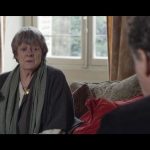The Sea (April 18, 2014)
How do you adapt a Man Booker Prize winning novel that is non-linear, has a cynical first person narrator, long passages of dense, lyrical prose instead of dialogue, asides to the reader and that is, essentially, an interior monologue on the great themes of the world: love, death, grief and time?
The answer is probably to ignore the book or give it to Terrence Malick, whose slow paced, dreamy and almost silent film, The Tree of Life, translated universal themes into images of extreme beauty.
What you don’t want to do is ask a neophyte feature director to connect the plot points and hope that a dedicated, talented cast can convey some meaning.
The Sea, the prolific Irish writer John Banville’s celebrated 2005 novel seems like the last novel in the British Library you would adapt for the cinema. For one thing, the word ‘stillness’ is used about a dozen times.
Yet, under first-time feature director Stephen Brown’s direction, a film it is and Banville himself, who wrote the script for The Last September and collaborated with Glen Close on the superb Albert Nobbs, has written the screenplay.
 Max Morden (Ciáran Hinds) is a retired art historian with writer’s block. He brings a manuscript of his book on the painter Pierre Bonnard to a guest house in a sleepy Irish beach town where he spent summers as a child.
Max Morden (Ciáran Hinds) is a retired art historian with writer’s block. He brings a manuscript of his book on the painter Pierre Bonnard to a guest house in a sleepy Irish beach town where he spent summers as a child.
Max is grieving the death of his wife Anna (Sinéad Cusack) from cancer. Near the sea, however, he finds himself also grieving the loss of his first love, a beautiful 10-year-old girl named Chloe Grace (Missy Keating).
So unlike his own stern, working class parents, fifty year ago Chloe’s fun loving, well-off parents Connie (Natascha McElhone) and Carlo (Rufus Sewell) rented the house that is now the guest house, where he is staying.
 Max’s memories of Chloe include her beautiful, sexy mother, her odd nanny, Rose (Bonnie Wright), who seemed a little too fond of Connie, and Chloe’s mute twin brother, Myles (Padhraig Parkinson).
Max’s memories of Chloe include her beautiful, sexy mother, her odd nanny, Rose (Bonnie Wright), who seemed a little too fond of Connie, and Chloe’s mute twin brother, Myles (Padhraig Parkinson).
As it is off-season, Max’s only companions in the guest house are the proprietor, Miss Vavasour (Charlotte Rampling), who takes an uncommon interest in him, and an eccentric ex-military man, Blunden (Karl Johnson), as mysterious and lonely as Max.
Max, whose daughter Clare (Ruth Bradley) is trying to keep her father on the wagon, starts to drink again to deal with his pain and guilt. Can the sea give him strength or will it consume him?
To his great credit, Banville has not resorted to narration, an annoying, but popular device of lazy scriptwriters, nor has he put his own passages of immense poetry into the mouths of his characters.
But the novel is all narration and prose, with its most profound passage about the continuity of life written in the rhythm of the waves, lulling the reader into a trance.
And while we can appreciate that Max is an aloof, self-deprecating cynic whose cold nature might be a defence about pain, we certainly cannot possibly grasp a whole separate dimension to the novel that comes in the form of a few judiciously used asides to the reader.
 When young Max (played in the film by Matthew Dillon) is trying to figure out the nature of Rose’s secret passion, the reader is assisted by a candid confession, not from Max, but from the author: ‘After all, why should I be less susceptible than the next melodramatist to the tale’s demand for a neat closing twist?’
When young Max (played in the film by Matthew Dillon) is trying to figure out the nature of Rose’s secret passion, the reader is assisted by a candid confession, not from Max, but from the author: ‘After all, why should I be less susceptible than the next melodramatist to the tale’s demand for a neat closing twist?’
In any other hands the novel might indeed have been a clichéd melodrama and the problem with the film is that it comes dangerously close.
Banville, with the beauty of his writing, his meditative insights, his clever use of imagery and mythology (the novel begins, ‘They departed, the gods, on the day of the strange tide.’) and his interesting use of the life of Bonnard (largely omitted from the film) pulls the novel out of that category, and rejects a neat, closing twist.
Unfortunately, this does not serve the film well and its ending is decidedly anti-climatic.
With admirable skill, Banville and Brown have managed to convey the fluid changes in time as Max’s mind continually wanders from past to present, and from deep thought to matter of fact subjects.
Just what the viewer who hasn’t read the book will make of it, is another matter. The actors, particularly Hinds, Cusack and Rampling, are perfectly cast, and do their best to imbue their characters with nuance, mystery and complexity.




